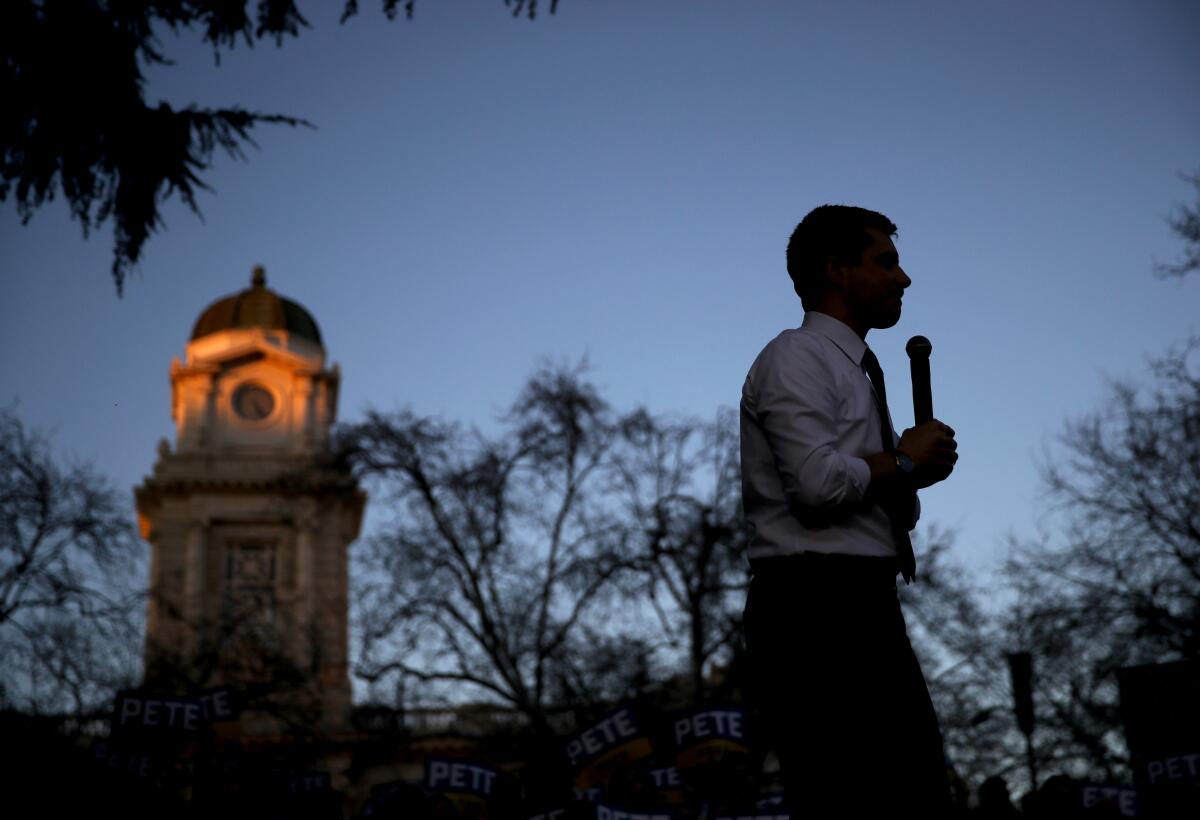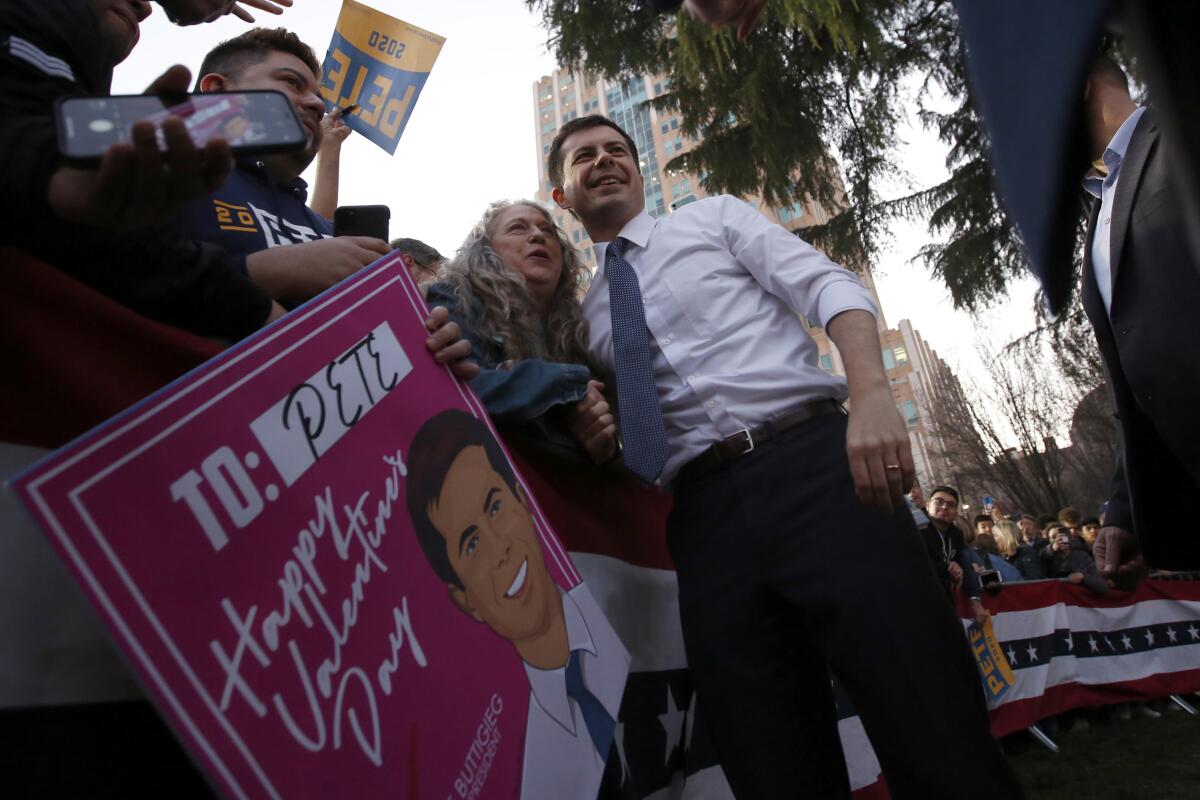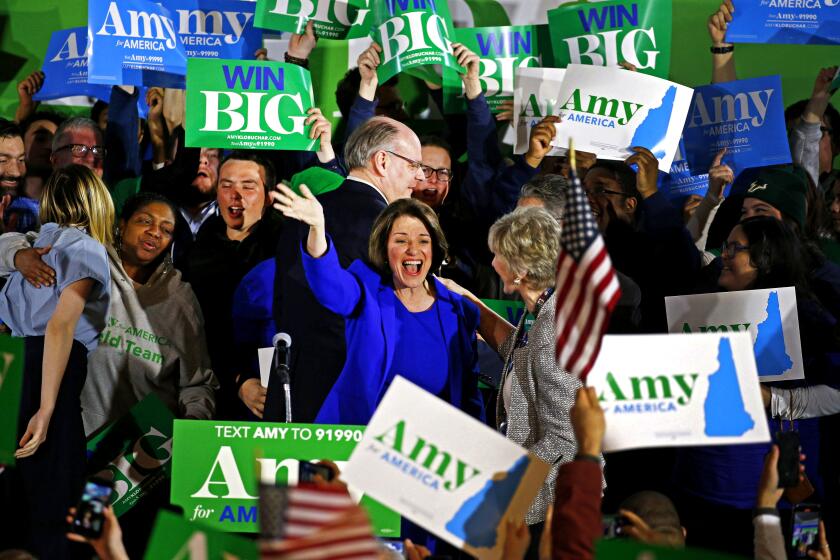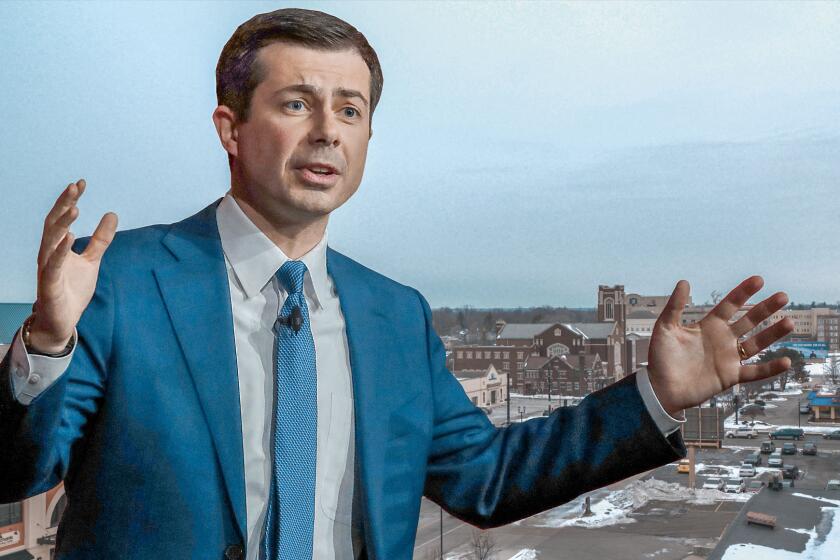Pete Buttigieg in Sacramento says much is riding on ‘forward-looking, racially diverse’ California

- Share via
SACRAMENTO — In Pete Buttigieg’s first town hall since a strong showing in the New Hampshire primary, the former South Bend, Ind., mayor was repeatedly interrupted on Friday by supporters in California’s capital chanting “President Pete! President Pete!”
“That’s got a nice ring to it, doesn’t it,” he said.
The candidate who was a virtual unknown a year ago was clearly feeling his recent successes, after being awarded the most delegates in Iowa’s caucuses and finishing a strong second to Vermont Sen. Bernie Sanders in Tuesday’s New Hampshire primary.
But his new place in the top tier of candidates has led to questions of how he’ll fare in a looming test: Can he win support from voters of color, who make up significant parts of the electorate in upcoming contests such as Nevada next weekend, South Carolina on Feb. 29, and California, Texas and a dozen other states on March 3?
Sanders, Buttigieg and Klobuchar take the top three spots in New Hampshire, while Elizabeth Warren and Joe Biden finish in single digits.
“The guy has clearly exceeded expectations and impressed people at every step of the way,” said veteran Democratic strategist Dan Newman, who is not backing a presidential candidate. But “one of the largest questions has been: Can he win in diverse states?”
As Buttigieg spoke to voters in Sacramento, he made a point of highlighting California’s multiculturalism and his policies aimed at lifting up minorities.
“We are thrilled with the progress of this campaign, but we’re only two states in. So much depends on what happens next,” he told a crowd gathered in a downtown park with Sacramento City Hall in the background. “And so much depends on what happens when the future-oriented, forward-looking, racially diverse, justice-minded state of California has it say.”
After decades of malaise, South Bend went through big changes during Pete Buttigieg’s tenure as mayor. But there is fear that the gains have been uneven and that its fragile progress could slip away.
As Buttigieg responded to questions from the audience, he spoke out about his plans to tackle racial inequality in economic opportunity, healthcare, education and other areas, as well as his proposals for immigration reform and opposition to building a border wall.
“My policy on the wall is I think it’s a dumb idea,” he said, adding that nations will need to use technology to secure their borders. Such challenges “will not be met with 17th century security technology like a big wall and a moat filled with alligators.”
At one point, he broke into Spanish to talk about the importance of fostering a sense of belonging for all in the nation.

The crowd at the Sacramento rally was less diverse than at many Democratic gatherings in this part of the state. Some voters of color in the audience said Buttigieg’s lack of support in their communities is because he isn’t as well known as many other candidates. Buttigieg has also faced mixed reviews from South Bend’s residents of color.
But Venezuela native Mai Townsend, 44, said she believes Buttigieg just needs to get his message out to minorities. She became interested in him after seeing his debate performances. “He’s very uplifting,” the interior designer said.
Townsend is deciding between Buttigieg and Massachusetts Sen. Elizabeth Warren, she said, and was concerned about the leftward drift among some in the Democratic Party.
“I come from a socialist country, so that message is a little bit scary for me,” Townsend said. Buttigieg “comes across as a moderate, a serious person.”
But among a faction of California voters, Buttigieg faces questions over his commitment to progressive values. At a fundraiser Friday morning in San Francisco where tickets cost up to $2,800, he was interrupted at the end of his remarks by three activists.
“You didn’t meet with any community members,” one protester shouted as she was ushered out of the gathering at the National LGBTQ Center for the Arts in the Mission neighborhood. The trio later said they were protesting Buttigieg’s lack of support for “Medicare for all,” free college and other issues important to the most liberal wing of the Democratic Party.
Those are policies espoused by Sanders, who leads in most recent polling in California. Buttigieg has trailed in polling, but the surveys were conducted before his early-state successes.
Sanders also leads among California donors, raising more than $19 million through Dec. 31, according to federal fundraising disclosures. Of the candidates still in the race, Buttigieg comes in second, bringing in more than $14 million.
The donor community’s interest in Buttigieg has grown since Iowa and New Hampshire, said Susie Tompkins Buell, the co-founder of clothing brand Esprit and outdoor retailer North Face. She initially supported California Sen. Kamala Harris’ presidential bid before she left the race, but Tompkins Buell also started raising money for Buttigieg in April.
“The excitement around him is very, very strong. It just keeps building,” she said. “It is so great to be around such beautiful positive energy during this especially dark time.”
Earlier this week, Buttigieg announced the endorsement of California Lt. Gov. Eleni Kounalakis, a former ambassador to Hungary in the Obama administration and a prodigious fundraiser.
Buttigieg needs a cash infusion to fund a fast expansion of his campaign in multiple states. His campaign announced Friday that as of Monday, he would have 16 paid staffers in California. In contrast, former New York City Mayor Michael Bloomberg has 300 staffers on the ground, Sanders has 90, and Warren has about 50.
On Friday morning, Buttigieg’s campaign put a call out supporters in California, seeking hosts for staffers and volunteers, asking if they “have an extra room, bed, or couch.”
Times staff writer Anthony Pesce contributed to this report.
More to Read
Get the L.A. Times Politics newsletter
Deeply reported insights into legislation, politics and policy from Sacramento, Washington and beyond. In your inbox twice per week.
You may occasionally receive promotional content from the Los Angeles Times.












